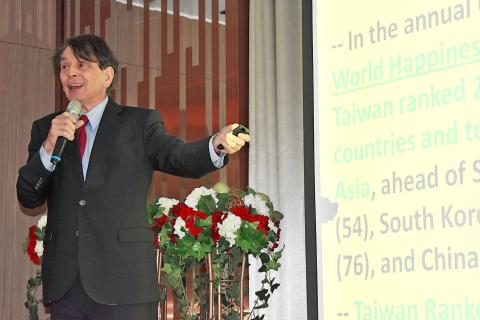The US government should forgo all references to “one China” in the context of Taiwan-related issues and policies, because the term is imprecise and misleading as Taiwan was never part of China, former American Institute in Taiwan (AIT) director William Stanton said yesterday.
Stanton, who headed the AIT’s Taipei office from 2009 to 2012, made the appeal during a speech on Taiwan-China policy in the US at a Taichung luncheon, which was organized by the Tai-Yang Cultural and Educational Foundation.
Taiwan was never part of China and the use of “one China,” which has always meant something different to Washington and Beijing, is inaccurate, misleading and confusing, Stanton said, adding that Washington should no longer say that it has a “one China” policy, as “that does not mean anything anymore.”

Photo: Chang Jui-chen, Taipei Times
The US government should also refrain from mentioning the Three Joint Communiques “as if they were the Bible,” Stanton said.
The first communique had the facts wrong and the third was effectively repudiated by the “six assurances” given to Taiwan by then-US president Ronald Reagan in 1982, he said.
Another problem is that Beijing and Washington have interpreted the first communique differently, Stanton added.
“They [the Chinese] use a different verb to say we acknowledge the Chinese position and they say cheng ren [承認, “agree with”], which has different meanings,” he said, referring to a section in the first part of the 1982 US-China joint communique that says that the US “acknowledged the Chinese position that there is but one China and Taiwan is part of China.”
Washington should initiate, but not necessarily advertise, exchanges of high-level officials between Taiwan and the US as called for in the Taiwan Travel Act, which was signed into law by US President Donald Trump in March, Stanton said.
However, Taiwan should carefully weigh the potential risk of such visits, he said.
Stanton was wary about a potential visit by President Tsai Ing-wen (蔡英文) to Washington, which some seem to be bandying about lately, including Joseph Bosco, former China country director in the office of the US secretary of defense, in an opinion piece on Monday last week in the political newspaper The Hill.
“If we are going to provoke China, it should be [for something] of lasting importance to Taiwan. I think that is the view of many people,” Stanton said, adding that Tsai should decide how much she would like to push for such a visit.
Asked on Tuesday last week to comment on Bosco’s piece, the Ministry of Foreign Affairs denied that Tsai planned to visit Washington, but did not elaborate.

Beijing could eventually see a full amphibious invasion of Taiwan as the only "prudent" way to bring about unification, the US Department of Defense said in a newly released annual report to Congress. The Pentagon's "Annual Report to Congress: Military and Security Developments Involving the People's Republic of China 2025," was in many ways similar to last year’s report but reorganized the analysis of the options China has to take over Taiwan. Generally, according to the report, Chinese leaders view the People's Liberation Army's (PLA) capabilities for a Taiwan campaign as improving, but they remain uncertain about its readiness to successfully seize

Taiwan is getting a day off on Christmas for the first time in 25 years. The change comes after opposition parties passed a law earlier this year to add or restore five public holidays, including Constitution Day, which falls on today, Dec. 25. The day marks the 1947 adoption of the constitution of the Republic of China, as the government in Taipei is formally known. Back then the Chinese Nationalist Party (KMT) governed China from Nanjing. When the KMT, now an opposition party in Taiwan, passed the legislation on holidays, it said that they would help “commemorate the history of national development.” That

Taiwan has overtaken South Korea this year in per capita income for the first time in 23 years, IMF data showed. Per capita income is a nation’s GDP divided by the total population, used to compare average wealth levels across countries. Taiwan also beat Japan this year on per capita income, after surpassing it for the first time last year, US magazine Newsweek reported yesterday. Across Asia, Taiwan ranked fourth for per capita income at US$37,827 this year due to sustained economic growth, the report said. In the top three spots were Singapore, Macau and Hong Kong, it said. South

Snow fell on Yushan (Jade Mountain, 玉山) yesterday morning as a continental cold air mass sent temperatures below freezing on Taiwan’s tallest peak, the Central Weather Administration (CWA) said. Snowflakes were seen on Yushan’s north peak from 6:28am to 6:38am, but they did not fully cover the ground and no accumulation was recorded, the CWA said. As of 7:42am, the lowest temperature recorded across Taiwan was minus-5.5°C at Yushan’s Fengkou observatory and minus-4.7°C at the Yushan observatory, CWA data showed. On Hehuanshan (合歡山) in Nantou County, a low of 1.3°C was recorded at 6:39pm, when ice pellets fell at Songsyue Lodge (松雪樓), a